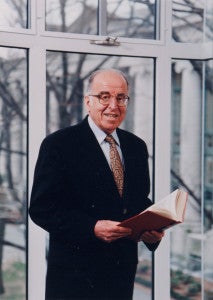Since 1987 the size of the Law School curriculum has increased by nearly 20 percent. And the job of putting the teaching program together each year has become more complex, as the School has tried to create smaller classes in both the first and second years, and sought to respond to widening demand in such “hot” areas as intellectual property, international law, and environmental law.
Guiding the process, along with the School’s curriculum committee, has been Professor Frank Sander ’52. Now, after working with two deans, two registrars, four associate deans, and about 8,300 J.D. students, Sander is stepping down as associate dean after 13 years, the longest term in HLS history, to return to teaching full-time. Filling his shoes is Todd Rakoff ’75, who holds the newly established dean of J.D. students position and who will continue Sander’s work with the other associate dean, Professor Carol Steiker ’86.
Sander leaves behind a challenging but satisfying job. “Putting together the teaching program of the School is like putting the round pegs of what the faculty wants to teach into the square holes of what the School needs,” said Sander. “It gave me a lot of opportunity to practice my negotiation and mediation skills. It’s also the best job around here because it takes on problems that are solvable in part because so many faculty members are ready and willing to help the School in what it needs.”
Sander says the teaching programs expanded in order to meet the changing demands of the legal profession, student interest, the arrival and departure of faculty, and School requirements. HLS also had to match up well with the offerings of other leading law schools. And personal needs of faculty—spousal issues, opportunities for fellowships and visiting professorships—had to be taken into account. Because of these and other factors, Sander says that over his tenure, the job became more and more difficult.
Sander, along with Professor Andrew Kaufman ’54, also led the planning process for the Campaign For Harvard Law School, the School’s $183 million fundraising campaign that ended in 1995. That effort, at the time the largest in the history of legal education, produced the renovated law library, several new buildings, additional faculty members and research programs, and increased support for the clinical program and financial aid. Sander says that his and Kaufman’s biggest challenge was to take a faculty list of new programs that cost $300 million, reduce it to $150 million, and get unanimous faculty approval for the plan. They were successful.
Now that he is stepping down, Sander will concern himself with teaching and research in alternative methods of dispute resolution, work that last year earned him an award from the ABA section on dispute resolution. He will also continue his work as a member of the drafting committee of the pending uniform mediation act and as vice chair of the Massachusetts Supreme Judicial Court standing committee on dispute resolution.
At the Law School, Sander will be running the winter term 2001 Negotiation Workshop. And he’ll continue to chair the Committee on Student Concerns.
